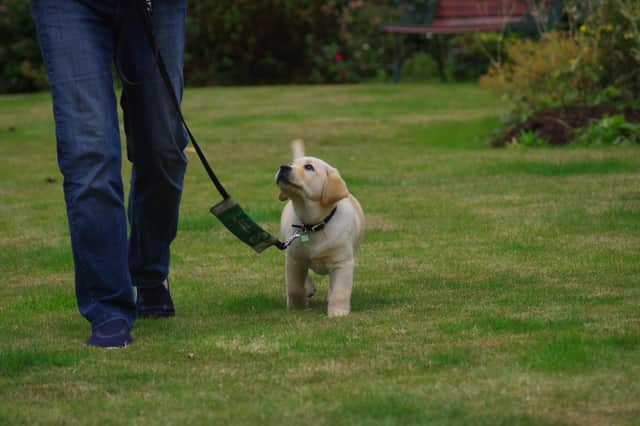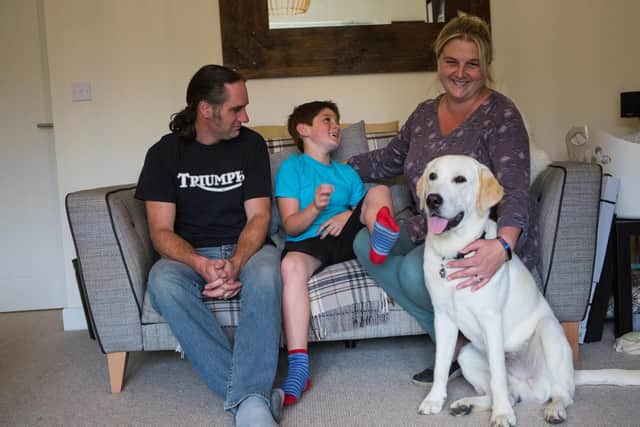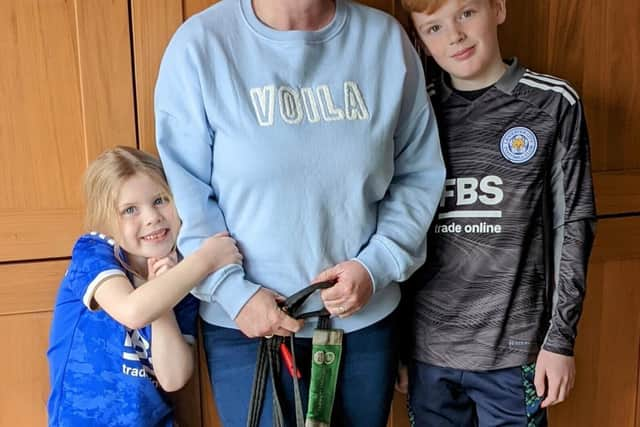Dog lovers in the Banbury area are invited to become puppy socialisers for area charity Dogs for Good


The voluntary role would be perfect for people wanting to learn more about puppy and dog behaviour and development, the charity's spokesman Laura Sturrock said.
"This role is ideal for people with plenty of time on their hands who can make a commitment of up to 18 months," she said. "The volunteer role entails caring for a pup in your home until they are 12 to 18 months old, teaching them to be polite and well-behaved dogs that are confident in many different environments.
Advertisement
Hide AdAdvertisement
Hide Ad"They must be able to attend local, monthly puppy classes too."


Dogs for Good supports people with a wide range of disabilities and conditions including dementia and autism through the help of highly trained assistance dogs and therapeutic sessions with their community dogs
Puppy volunteers provide an essential step to ensuring the charity can continue its work. The pandemic has had a big impact on recruiting volunteers and the charity is now urgently seeking to increase the numbers of people in this role.
The charity needs lots more volunteers to love, care for, nurture and socialise puppies from the age of eight weeks for about 12 to 18 months when they can go on to be expertly trained as life-changing assistance dogs.
Advertisement
Hide AdAdvertisement
Hide AdAnd to provide more information, the charity is holding a special session for people who want to know more on Wednesday, April 27 at 9am.


The session will cover an introduction of what to expect as a puppy socialiser, information about the support you’ll receive and give visitors a chance to ask questions to Dogs for Good’s expert team of puppy coordinators. Click here for more information.
Chris Muldoon, Operations Manager at Dogs for Good is responsible for developing the charity’s breeding programme, puppy socialisation and dog training.
He said: “The last two years have had a real impact on our ability to recruit new socialisers. The demand for our services is incredibly high, but in order for us to support more people, we need to start with supporting our pups through the first year of their lives. That support starts with finding people who have the time to care for and guide our pups before they start their formal training."
Advertisement
Hide AdAdvertisement
Hide Ad“Puppies are curious, mischievous and sentient beings that need lots of guidance and care, so the role of a puppy socialiser is hugely important. There’s lots of support from our puppy team who help volunteers. It’s a demanding role but there are huge amounts of joy, fun involved as well as real sense of fulfilment.”
Dogs for Good’s puppy team provides ongoing support and training in the form of weekly classes, telephone and online advice and also provides videos to demonstrate certain activities.
They help socialisers build up the puppy’s confidence around shopping centres and cafes, road traffic, crossing roads, visiting crowded and rural areas plus anything else they may encounter in their future life as an assistance dog.
In addition, the charity’s existing community of puppy socialisers are extremely welcoming of new recruits and are always happy to lend a helpful hand.
Advertisement
Hide AdAdvertisement
Hide AdMichelle Spilsbury from Adderbury near Banbury in Oxfordshire, has been a puppy socialiser for five years and is currently on her fifth puppy, Sheldon, an eight-month-old yellow Labrador x Golden Retriever. Michelle and her husband Adrian have a teenage son called Zach and they used to be foster carers.
She said: “I started puppy socialising because my son wanted a puppy and we’d always rescued dogs in the past. A friend, who worked for Dogs for Good, suggested that puppy socialising might be a good solution.
“I researched the charity online and discovered how amazing their dogs are and I thought this would be a great way for us to make a difference and do some good.
“Zach loves the puppies and he’s always sad when they leave but he understands that it’s for the greater good - we just look after them for a while and then they go on to help someone who needs them more than we do.
Advertisement
Hide AdAdvertisement
Hide Ad“I also get upset when I have to say goodbye to the puppies, but when you hear about how they’ve gone on to change people’s lives it makes it all worthwhile.”
Chris Muldoon added: “Having a puppy gets you out for a walk every day and can break the ice when you meet people and create a talking point. Many socialisers say they feel fitter and healthier and they’ve met lots of people and made new friends.
“Often people discount this role because they feel that they couldn’t give the puppy back once their job is done. But our socialisers who have done this many times say that while it’s never something they look forward to, they also experience immense pride when they see how the part they have played in that puppy’s life has made a life-changing difference to someone with a disability. We have socialisers who are on their tenth and even twentieth puppy so it really can be done.”
Most expenses are covered by the charity including food, health insurance and vet bills and volunteers are provided with an initial ‘puppy pack’ with essentials such as bowls and a lead. However, volunteers may be asked to buy a bed for the dog and wish to buy some additional treats and toys.
Advertisement
Hide AdAdvertisement
Hide AdAlthough no experience is necessary, puppy socialisers are required to meet the following criteria:
Have a fully-fenced safe and secure garden, be away from the puppy for no more than two hours (in the first few weeks) and four hours (for the remaining time you have the puppy) per day, have no more than two pet dogs in the home, drive or have access to someone at all times who can drive you and the puppy.
With the support of our puppy department you will be willing to train the puppy in the basics such as house training, general obedience and walking on the lead.
You will need to be able to spend some time every day on activities to meet the health and welfare needs of and socialise the puppy. Guidance will be given and environments that need to be covered at some stage include shops, cafes, train stations, buses, crowded and rural areas
Advertisement
Hide AdAdvertisement
Hide AdYou will need to be able to attend monthly puppy classes and group visits and allow home visits from a member of our puppy training team and provide the puppy with regular contact with children, other dogs and cats.
For more information visit www.dogsforgood.org/get-involved/volunteer/puppy-socialiser/